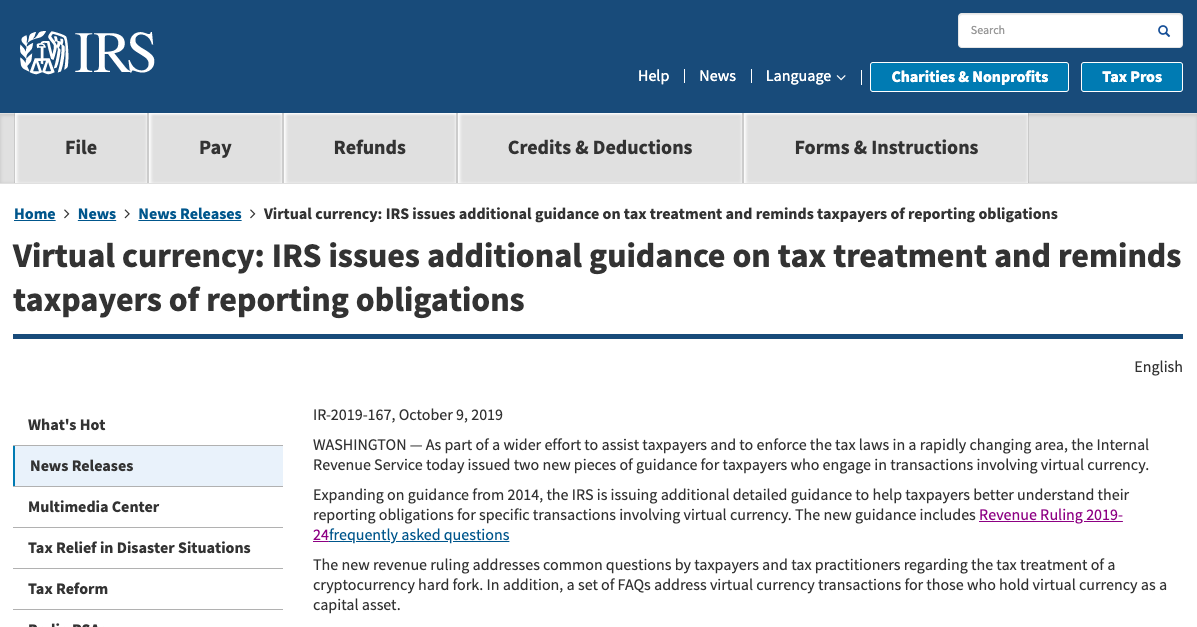After a lapse of five years, the United States updated the cryptocurrency tax rules, still did not figure out the airdrops and forks?
On October 9, 2019, the Internal Revenue Service (IRS) official website published a guide on cryptocurrency taxation, the first update since the IRS released this document in 2014 .

On March 25, 2014, in the “2014-21” document issued by the IRS, the IRS first taxed the cryptocurrency as an asset rather than a currency. But in the next five years, as the cryptocurrency market grew, IRS did not update the details.
- Jia Nan Zhi Zhi went to Nasdaq, and the mining giant's listing road ushered in the final
- Vitalik Devon Lecture: How PoS Makes Ethereum Network Safer
- DEX Monthly | Ethereum DEX Shuangxiong: IDEX and Eth2dai
In May of this year, IRS Director Charles Rettig finally said that the IRS is working hard to study more details of new confidential currency taxes. Now that the document is released, how will IRS tax the cryptocurrency industry?
"It doesn't seem very well understood for airdrops and hard forks."
In addition to continuing to emphasize that cryptocurrencies are treated as taxes on property, the details of the update include how to collect tax on the fork currency, whether the airdrop proceeds are taxed, and how to calculate the tax that the cryptocurrency owner should pay when he owns the cryptocurrency. Wait.
First, the forked coins (like BCH, ETC, etc.) that are forked from the existing blockchain will be taxed in the same way as the cryptocurrency on the mainstream blockchain.
But "If a cryptocurrency is hard-forked and you don't receive a new cryptocurrency, then whether this fork is achieved by airdrop or some other type of transfer, your income will not be Included in the tax range."
However, according to the Coin D esk article, Jerry Brito, executive director of Coin Center, a non-profit organization focused on cryptocurrency, said that the “language” of the IRS in the document has many The incomprehensible place, "It (IRS) seems to be not very understanding of the concept of hard forks and shorts."
Because this move of RS may bring unnecessary trouble, people who are willing to let you pay more taxes, "just need to fork the blockchain network you have, or impose an airdrop that you don't want." .
Second, personal income will also be included in the tax range. But how is the income from the user’s “airdrop” income taxed? The document is also not clearly stated.
The document shows that individuals first need to total the cost of purchasing cryptocurrencies, including the price at which a certain token is purchased, transaction fees, etc. Second, if the individual is in a DEX (decentralized exchange) or over-the-counter transaction The cryptocurrency purchased will be calculated using the “cryptographic price index to determine the fair value of the market”.
To put it simply, if a person purchases cryptocurrency in an over-the-counter transaction, the tax rate will be based on the cryptocurrency price at the time of purchase on the Internet.
However, the cryptocurrency industry is highly volatile. When taxing personal income, there are still problems that are not explained in the document. For example, I own an Ethereum wallet. When I receive an airdrop that is automatically distributed by the system, the token I receive will also be counted as my income and will be calculated into the tax range. The tax amount is the one I received the token. Is the price calculated or calculated at the price of the shot?
Finally, the IRS will use the "first-in first-out" calculation method for accounting, that is, the tax calculation at the price when the user buys the cryptocurrency.
National cryptocurrency tax policy step by step
It is understood that this year, tax authorities in various countries have issued documents to speed up tax operations in the cryptocurrency industry, including Australia, Japan, Russia, Singapore and other countries.
The Australian Taxation Office (ATO) published an article on the official website on June 18, stating that if a company obtains capital gains by conducting transactions related to cryptocurrencies, it may be necessary to pay a corresponding tax for some or all of the proceeds. Considered as part of the business, the profits obtained will be treated as ordinary income rather than capital gains.
However, ATO has no specific details on how to levy taxes on personal cryptocurrency.
On June 5, the Asahi Shimbun of Japan pointed out that the Japanese tax authorities are investigating cryptocurrency income that has not been reported to the tax authorities. In Japan, cryptocurrency income is classified as a taxation of “miscellaneous income”. If you earn 200,000 yen (about RMB 13,000) in cryptocurrency within one year, you should declare and pay. Income tax.
On August 1, the Brazilian Federal Ministry of Income said that private investors and companies engaged in cryptocurrency transactions must report to the Ministry of Finance if they have more than $7,600 (about RMB 54,000).
Compared with the previous State Administration of Taxation, the policies of the UK Taxation Office (hereinafter referred to as HMRC) are obviously stricter and more detailed. On August 6, the cointelegraph article showed that the UK Revenue Agency is urging cryptocurrency exchanges to disclose the names and transaction history of customers in order to recover unpaid taxes.
The source also said that HMRC's move was to learn the IRS model, which issued a warning letter to 10,000 Americans in July, stating that these people did not report their real income according to the law, and had previously sent mail to Americans many times. caveat.
But in many national tax authorities that want to get some oil from the cryptocurrency, Singapore is a clear stream.
In July, the Singapore Government Taxation Office (IRAS) proposed to eliminate the Goods and Services Tax (GST) in cryptocurrency transactions, which was written in a draft guide. If the draft guide passes legislation, the amendment will be from 2020. Effective January 1 of the year. This will also ease the burden on some cryptocurrency companies.
Australia is as "tolerant" as Singapore. In October 2017, according to CoinDesk, Australian legislators passed a piece of legislation that ended the so-called double taxation, exempting the responsibility for paying goods and services taxes on the purchase of cryptocurrencies.
However, it is worth noting that in this IRAS regulation, stable currency may not qualify for GST tax exemption:
"Any digital tokens denominated in any legal currency or linked to any legal currency are not eligible for digital payment tokens."
Looking at the world, taxing cryptocurrencies is a general trend.
According to a previous article by Sina Finance, 47.3% of the 19 countries that have relatively clear regulations on cryptocurrency tax levy capital gains tax on cryptocurrency traders; 26.3% of countries levy taxes on mining practices; % of countries impose VAT on cryptocurrency transactions. 26.3% of the countries levy cryptocurrency profit taxes in accordance with corporate (commercial) income tax standards.
At the two sessions held at the beginning of this year, the National People's Congress representative Shi Guilu clearly stated the issue of cryptocurrency tax in the "Proposal on the Construction of Virtual Currency Regulatory System Regulations".
Therefore, in the near future, the cryptocurrency industry practitioners who have been able to make a fortune overnight may have to recalculate their accounts in their hearts and see how much they will have after paying taxes.
Reference article and original link:
IRS official website file on cryptocurrency tax
Https://www.irs.gov/pub/irs-drop/rr-19-24.pdf
IRS 2014 cryptocurrency tax file
Https://www.irs.gov/pub/irs-drop/n-14-21.pdf
The IRS Just Issued Its First Cryptocurrency Tax Guidance in 5 Years
Https://www.coindesk.com/the-irs-just-issued-its-first-cryptocurrency-tax-guidance-in-5-years
The cryptocurrency tax policy of various countries is gradually improved, which is more conducive to the development of cryptocurrency
https://new.qq.com/rain/a/20181024A16UMH
Source: Muggle
Original article, unauthorized reproduction is prohibited.
We will continue to update Blocking; if you have any questions or suggestions, please contact us!
Was this article helpful?
93 out of 132 found this helpful
Related articles
- The combination of stable currency and DeFi will create the next big event, said former Jetcoin Core developer Jeff Garzik.
- Established for 6 years, with a valuation of 15 billion, mining machine giant Jia Nan Zhizhi will be listed in the US
- Blockchain for 15 months, Microsoft Azure, Office, DID evolution
- Cornell University professor Emin Gün Sirer confirmed attending the World Blockchain Conference in Wuzhen, where he had published PoW digital currency for 6 years.
- QKL123 market analysis | Bitcoin ETF was rejected in line with expectations, Syria warfare helped to rebound (1010)
- ICO will disappear completely in 2020
- Explore: How DeFi Improves the Traditional Financial System





